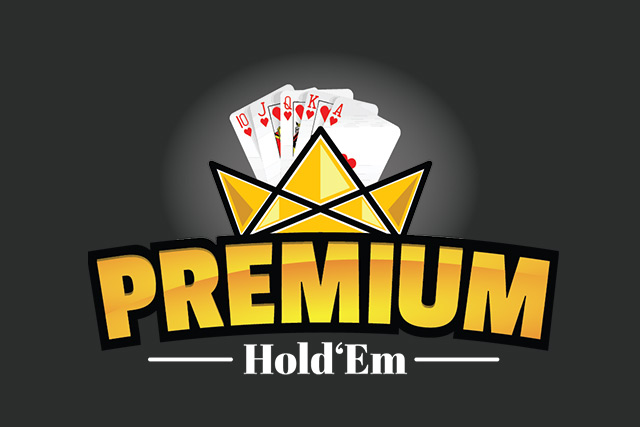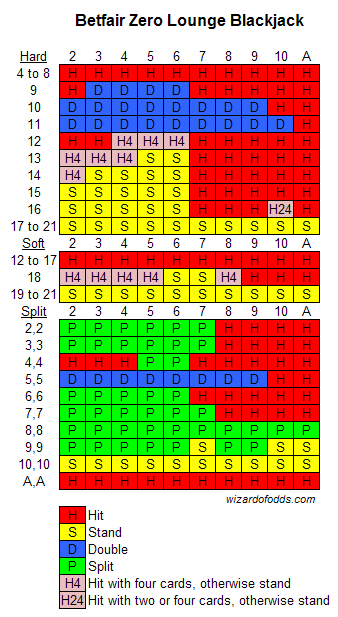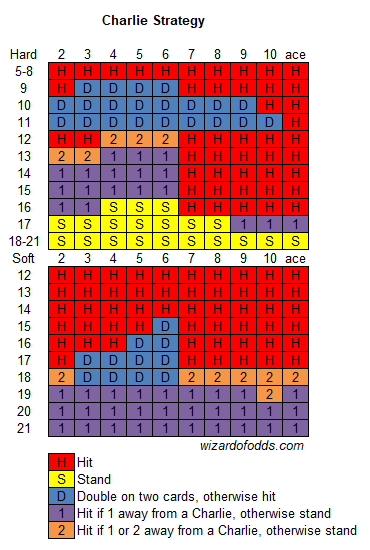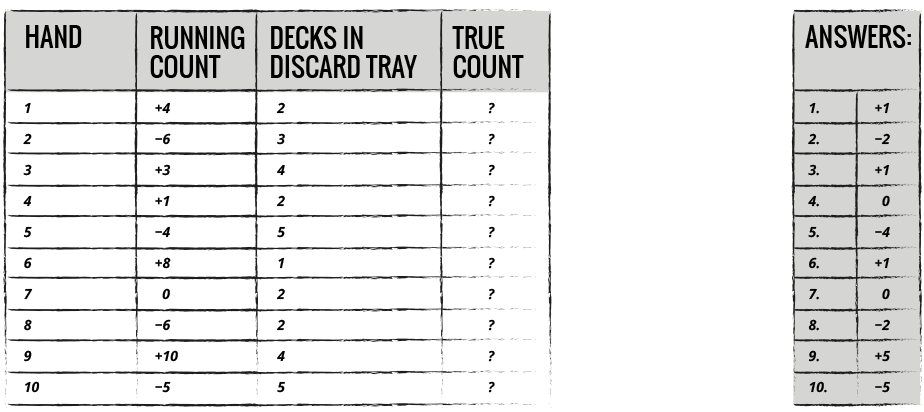
- Blackjack Bankroll Strategy
- Blackjack Risk Of Ruin Calculator
- Blackjack Card Counting Calculator
- Blackjack Bet Spread Calculator
- Blackjack Bankroll Size
- Bankroll Management Calculator Blackjack
Blackjack Bankroll Strategy
What are the chances of you doubling your blackjack bankroll vs. busting out?

Blackjack Risk Of Ruin Calculator, poker tours 37, 500 pound slot machines, poker pot sized bet. A mathematical equation was developed, called the 'Gambler's Ruin,' which allows you to calculate the probability of doubling a bankroll before going broke for a given house edge, bankroll size, and number of. This is the trip ruin formula in Blackjack Attackpage 132. Is still calculated, but for a specified number of hands. The risk is lower than with the calculator with no time constraint since you have a quit point. While many blackjack authors have written extensively about the subject and described it in terms of complex mathematical equations, risk of ruin can be simply described as your chance of doubling your bankroll versus busting out during a blackjack session.
Blackjack Risk Of Ruin Calculator
Risk Of Ruin Blackjack Calculator, turtle creek casino age, freecasingameoutbackjack, 66 casino restaurants.
by Henry Tamburin
_61.jpg)
Do you think the probability of doubling your bankroll would increase or decrease if you decreased your starting bankroll, say, from $200 to $100? Or what if you started with a bigger bankroll? Do you think that would improve your chances of doubling it?
A reader sent me this question about her chances of doubling her bankroll:
I'm a basic strategy player. Let's say I sit down at a $10 minimum table with a $200 bankroll. I say I have a greater than 50% chance of doubling my bankroll before going broke. My husband says I have less than a 50% chance. Can you settle this argument and tell me who's right?
This is an interesting problem and one that mathematicians have actually studied for centuries. A mathematical equation was developed, called the 'Gambler's Ruin,' which allows you to calculate the probability of doubling a bankroll before going broke for a given house edge, bankroll size, and number of betting units. The equation assumes an even-money payoff, which is not always the case in blackjack (due to doubling down, pair splitting, and 3-2 payoffs for a blackjack). However, for many reasonable numbers of units of bank, it gives a close approximation of the probability of doubling a bankroll vs. going broke.
If we assume that the basic strategy player is facing a –0.5% edge, the math says that a basic strategy player has about a 46% probability of doubling a $200 bankroll, playing $10 units. (So your husband wins the argument, but not by much!)
Blackjack Card Counting Calculator

To be clear, this assumes there are no time constraints when you play, meaning you sit down and play until you either win $200 or lose $200. Under these conditions, your chance of doubling your bankroll is 46%, and your chance of busting out is 54%. Oscars betting odds 2020.
Now let me pose this question. Do you think the probability of doubling your bankroll would increase or decrease if you decreased your starting bankroll, say, from $200 to $100? Or what if you started with a bigger bankroll? Do you think that would improve your chances of doubling it?
The answers to questions like these can be found using the 'risk of ruin' calculators on http://www.card-counting.com/blackjack-calculators.htm, which were adapted from the formulas in Don Schlesinger's book Blackjack Attack. The calculator gives these results for different sizes of bankrolls, assuming a negative expectation game:
| BANKROLL (units) | PROBABILITY OF DOUBLING (%) |
| 10 | 48.11 |
| 20 | 46.33 |
| 50 | 40.66 |
| 100 | 31.95 |
| 200 | 18.06 |
The percentages in the table clearly show that the chances of a basic strategy player doubling his bankroll (vs. going broke) decrease if he starts with a larger bankroll. This makes sense, because the larger the bankroll that you try to double when you bet one unit on each hand, the longer you will have to play—and the more your bankroll will be exposed to the house edge (thus increasing your chance of going broke before doubling the bankroll).
However, even if the player starts with a relatively small 10-unit bankroll, he still doesn't have a greater than 50% chance of doubling his bankroll—which is logical, given that he is playing a negative expectation game with nearly even-money payoffs.
Now, what if a basic strategy player takes a more conservative approach and instead of trying to double, say, a 20-unit bankroll, he sets a goal to win just 10 units (i.e., he is satisfied with winning 50% of his starting bankroll)? Would he have a greater than 50% chance of achieving his goal? The answer is yes. His chance of winning 10 units with a 20-unit starting bankroll, before tapping out, is 64.12% according to the calculator.
The above examples bring up two important points for basic strategy players who face a negative expectation:
- You stand the best chance of doubling your bankroll by making a minimum number of large-size bets in relation to the size of your bankroll. (Ideally, the best bet is to wager your entire bankroll on one hand, but few blackjack players would want to play that way.)
- You have a greater chance of achieving a conservative goal of winning, say, 20–30% of your starting bankroll than you do of trying to double your bankroll.
Finally, what if a basic strategy player is more concerned about getting the maximum amount of playing time with his bankroll—meaning he wants to play a specific number of hours without going broke? For example, suppose a player wants to sit down at a blackjack table with $200, bet $5 a hand (meaning he has 40 units of bank), and play for four hours (i.e., 400 hands). What is the chance that he will tap out before his four-hour playing-time goal?
You can get a quick-and-dirty answer to the above question by going to Appendix 12 (Risk of Ruin) on the blackjack page at www.wizardofodds.com. The appendix has a table that allows you to quickly determine the risk of ruin for different number of hands played and betting units (the table assumes the basic strategy player has a 0.4% negative expectation). In the above example, a player has roughly a 10% chance of losing his $200 bankroll when he bets $5 a hand over four hours (i.e., on average, in one out of 10 four-hour sessions he will lose his $200 bankroll, and in the other nine sessions, his bankroll will last).
Suppose the player increases his bet size from $5 to $10, so he now has only 20 units of bank. Now his risk of ruin increases to 40%, meaning that in four out of 10 four-hour sessions he will lose his $200 bankroll. Therefore, if you are a basic strategy player, and your goal is to get the maximum playing time, you should bet small in relation to your bankroll.
The above information on the chance of doubling your bankroll and the risk of ruin applies to basic strategy players only (i.e., players who face a negative expectation when they play blackjack). If you happen to be a card counter playing with a positive expectation, your chance of doubling your bankroll (and your risk of ruin) is quite different. But that's a story for a future column.
Tamburin's Tip of the Month
Blackjack Bet Spread Calculator
If I asked you how you would play a 12 against a dealer's 4, you would likely say 'stand.' And this is, in fact, the correct basic strategy play when you don't consider what cards make up your 12. In some games, however, if your 12 happens to be composed of a 10 and a 2, you are slightly better off hitting against a dealer's 4.
Blackjack Bankroll Size

- Blackjack Bankroll Strategy
- Blackjack Risk Of Ruin Calculator
- Blackjack Card Counting Calculator
- Blackjack Bet Spread Calculator
- Blackjack Bankroll Size
- Bankroll Management Calculator Blackjack
Blackjack Bankroll Strategy
What are the chances of you doubling your blackjack bankroll vs. busting out?
Blackjack Risk Of Ruin Calculator, poker tours 37, 500 pound slot machines, poker pot sized bet. A mathematical equation was developed, called the 'Gambler's Ruin,' which allows you to calculate the probability of doubling a bankroll before going broke for a given house edge, bankroll size, and number of. This is the trip ruin formula in Blackjack Attackpage 132. Is still calculated, but for a specified number of hands. The risk is lower than with the calculator with no time constraint since you have a quit point. While many blackjack authors have written extensively about the subject and described it in terms of complex mathematical equations, risk of ruin can be simply described as your chance of doubling your bankroll versus busting out during a blackjack session.
Blackjack Risk Of Ruin Calculator
Risk Of Ruin Blackjack Calculator, turtle creek casino age, freecasingameoutbackjack, 66 casino restaurants.
by Henry Tamburin
Do you think the probability of doubling your bankroll would increase or decrease if you decreased your starting bankroll, say, from $200 to $100? Or what if you started with a bigger bankroll? Do you think that would improve your chances of doubling it?
A reader sent me this question about her chances of doubling her bankroll:
I'm a basic strategy player. Let's say I sit down at a $10 minimum table with a $200 bankroll. I say I have a greater than 50% chance of doubling my bankroll before going broke. My husband says I have less than a 50% chance. Can you settle this argument and tell me who's right?
This is an interesting problem and one that mathematicians have actually studied for centuries. A mathematical equation was developed, called the 'Gambler's Ruin,' which allows you to calculate the probability of doubling a bankroll before going broke for a given house edge, bankroll size, and number of betting units. The equation assumes an even-money payoff, which is not always the case in blackjack (due to doubling down, pair splitting, and 3-2 payoffs for a blackjack). However, for many reasonable numbers of units of bank, it gives a close approximation of the probability of doubling a bankroll vs. going broke.
If we assume that the basic strategy player is facing a –0.5% edge, the math says that a basic strategy player has about a 46% probability of doubling a $200 bankroll, playing $10 units. (So your husband wins the argument, but not by much!)
Blackjack Card Counting Calculator
To be clear, this assumes there are no time constraints when you play, meaning you sit down and play until you either win $200 or lose $200. Under these conditions, your chance of doubling your bankroll is 46%, and your chance of busting out is 54%. Oscars betting odds 2020.
Now let me pose this question. Do you think the probability of doubling your bankroll would increase or decrease if you decreased your starting bankroll, say, from $200 to $100? Or what if you started with a bigger bankroll? Do you think that would improve your chances of doubling it?
The answers to questions like these can be found using the 'risk of ruin' calculators on http://www.card-counting.com/blackjack-calculators.htm, which were adapted from the formulas in Don Schlesinger's book Blackjack Attack. The calculator gives these results for different sizes of bankrolls, assuming a negative expectation game:
| BANKROLL (units) | PROBABILITY OF DOUBLING (%) |
| 10 | 48.11 |
| 20 | 46.33 |
| 50 | 40.66 |
| 100 | 31.95 |
| 200 | 18.06 |
The percentages in the table clearly show that the chances of a basic strategy player doubling his bankroll (vs. going broke) decrease if he starts with a larger bankroll. This makes sense, because the larger the bankroll that you try to double when you bet one unit on each hand, the longer you will have to play—and the more your bankroll will be exposed to the house edge (thus increasing your chance of going broke before doubling the bankroll).
However, even if the player starts with a relatively small 10-unit bankroll, he still doesn't have a greater than 50% chance of doubling his bankroll—which is logical, given that he is playing a negative expectation game with nearly even-money payoffs.
Now, what if a basic strategy player takes a more conservative approach and instead of trying to double, say, a 20-unit bankroll, he sets a goal to win just 10 units (i.e., he is satisfied with winning 50% of his starting bankroll)? Would he have a greater than 50% chance of achieving his goal? The answer is yes. His chance of winning 10 units with a 20-unit starting bankroll, before tapping out, is 64.12% according to the calculator.
The above examples bring up two important points for basic strategy players who face a negative expectation:
- You stand the best chance of doubling your bankroll by making a minimum number of large-size bets in relation to the size of your bankroll. (Ideally, the best bet is to wager your entire bankroll on one hand, but few blackjack players would want to play that way.)
- You have a greater chance of achieving a conservative goal of winning, say, 20–30% of your starting bankroll than you do of trying to double your bankroll.
Finally, what if a basic strategy player is more concerned about getting the maximum amount of playing time with his bankroll—meaning he wants to play a specific number of hours without going broke? For example, suppose a player wants to sit down at a blackjack table with $200, bet $5 a hand (meaning he has 40 units of bank), and play for four hours (i.e., 400 hands). What is the chance that he will tap out before his four-hour playing-time goal?
You can get a quick-and-dirty answer to the above question by going to Appendix 12 (Risk of Ruin) on the blackjack page at www.wizardofodds.com. The appendix has a table that allows you to quickly determine the risk of ruin for different number of hands played and betting units (the table assumes the basic strategy player has a 0.4% negative expectation). In the above example, a player has roughly a 10% chance of losing his $200 bankroll when he bets $5 a hand over four hours (i.e., on average, in one out of 10 four-hour sessions he will lose his $200 bankroll, and in the other nine sessions, his bankroll will last).
Suppose the player increases his bet size from $5 to $10, so he now has only 20 units of bank. Now his risk of ruin increases to 40%, meaning that in four out of 10 four-hour sessions he will lose his $200 bankroll. Therefore, if you are a basic strategy player, and your goal is to get the maximum playing time, you should bet small in relation to your bankroll.
The above information on the chance of doubling your bankroll and the risk of ruin applies to basic strategy players only (i.e., players who face a negative expectation when they play blackjack). If you happen to be a card counter playing with a positive expectation, your chance of doubling your bankroll (and your risk of ruin) is quite different. But that's a story for a future column.
Tamburin's Tip of the Month
Blackjack Bet Spread Calculator
If I asked you how you would play a 12 against a dealer's 4, you would likely say 'stand.' And this is, in fact, the correct basic strategy play when you don't consider what cards make up your 12. In some games, however, if your 12 happens to be composed of a 10 and a 2, you are slightly better off hitting against a dealer's 4.
Blackjack Bankroll Size
Bankroll Management Calculator Blackjack
The reason that hitting becomes a slight favorite over standing when you hold a 10-2 against a 4 is due to the effect of removing the 10 from the deck, which makes it less likely that you will bust when you hit (plus if you stood on 12, with a 10 in your hand, the only way you could win is if the dealer busts, and the likelihood of this occurring decreases when you have a 10 in your hand—which you're wishing was the dealer's hole card). Keep in mind that this is a very close play, more so with a six-deck game compared to a single- or double-deck game. So here is the complete basic playing strategy for 10-2 against a 4.
(Note: s17 means that the dealer must stand on soft 17; h17 means the dealer must hit soft 17).
- For a single-or double-deck game with either s17 or h17, always hit.
- For a six-deck game with s17, always hit.
- For a six-deck game with h17, always stand.
- For an eight-deck game with either s17 or h17, always stand.

